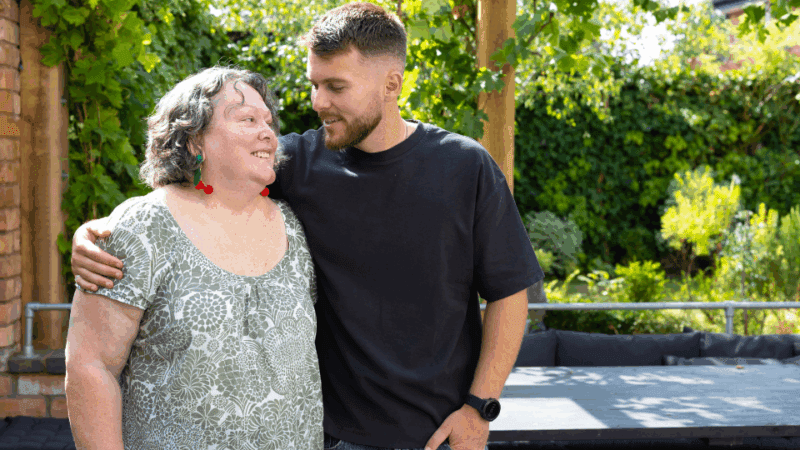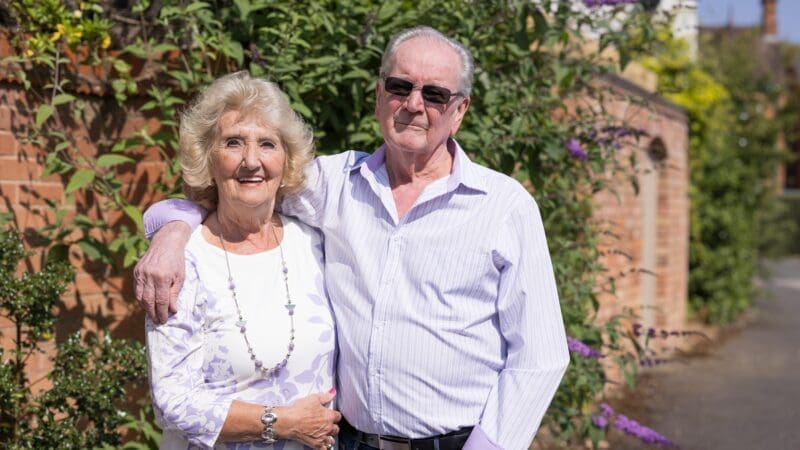
Will and Ronnie’s story – “I talk to everyone about dementia”
Ronnie and her son, Will, reflect on how her diagnosis of young onset Alzheimer’s disease has impacted their lives.
When a person is diagnosed with dementia, they and the people close to them are likely to feel a wide range of emotions. These could include uncertainty, fear, anger, sadness or even relief. There is no right or wrong way to feel, and all of these are perfectly normal responses to the news.
On this page, our dementia specialist Admiral Nurses will explain how a dementia diagnosis might impact you emotionally, and how understanding your feelings can help you find ways to cope, communicate with the people around you and access the right support.
Different people respond to a dementia diagnosis in different ways. Their reaction – whether they have the diagnosis themselves or someone close to them has been diagnosed – will vary according to their own personality, and other factors such as:
Often, the changes that dementia causes in someone’s behaviour and/or personality will influence how they respond emotionally to their diagnosis.
For example, changes in the brain may affect how they process information – the person may not fully understand their diagnosis, or they may forget that they have been diagnosed and become upset when they are reminded of it.
Changes in the person’s personality may affect their emotions – for example, their feelings may be more extreme, such as intense anger or despair.
Other people’s reactions to the diagnosis may also affect the person’s emotional response. Comments like, “You’re too young to have dementia,” “There’s nothing wrong with your memory,” or, “You seem fine to me” can be upsetting.
If you are diagnosed with dementia, you may feel a sense of shock and denial, especially if the diagnosis was unexpected or you thought the symptoms were due to another condition. This can be particularly true when someone is diagnosed with young onset dementia (where symptoms develop before the age of 65), as many people assume dementia only affects older people and are not expecting it in a younger person.
It’s natural to feel anxious about what will happen after a diagnosis of dementia, both immediately and in the future. If the anxiety is interfering with everyday life, speak to your GP about support they might be able to offer. Find out more about anxiety and dementia.
Feelings of sadness and grief for the life you thought you would live and how that is likely to change are extremely common. You may also feel a loss of identity as you process the changes that have happened and will continue to happen as dementia progresses – for example, if you are faced with the possibility of having to give up a job you have enjoyed for many years.
Dementia itself can cause changes in personality, behaviour, communication and the ability to cope with challenging situations. These changes, along with increasing difficulties with everyday living and loss of independence, can result in frustration.
You may feel angry about the diagnosis itself with a sense of injustice that this is happening to you. You may also feel angry about how dementia is affecting your life, or if you feel other people don’t understand what you’re going through.
You may experience feelings of guilt related to becoming increasingly reliant on loved ones or the impact of behavioural changes on the people around you.
Stigma and misconceptions about dementia can have a significant emotional impact on people who are living with the condition. For example, they might feel embarrassed or ashamed of their symptoms, or frustrated and upset if the people around them treat them differently. Our Admiral Nurses share tips for handling stigma and misconceptions.
Family members and friends may try to hide their own emotions when someone close is diagnosed with dementia for fear of upsetting them, or may feel that they should be able to cope. Whatever emotions you are going through, it’s important to acknowledge them and learn to manage them.
Recognising your emotions is key to understanding why you feel this way and what you can do to manage these feelings in a healthy way. Some people find journalling or a creative project can help them identify and express their emotions without any pressure.
Reaching out for help is not a weakness. If you feel you are struggling, it’s important to find support. This might include:
It’s important to note that it’s never too early to get help and support, so don’t wait until your emotions become unmanageable.
If a family member or friend is diagnosed with dementia, it is natural for it to have an emotional impact on you too. Understanding your emotions and knowing what support is available, as well as what to expect from the changes in your relationship with the person, can be helpful.
You may have difficulty accepting the dementia diagnosis and the changes in your loved one. You might feel guilty if you didn’t notice the changes, especially if their symptoms do not match up with your perception of how dementia presents, or if the person is younger. You might also experience guilt if you are finding it hard to support the person and feel you aren’t doing a ‘good enough’ job, or if you sometimes become frustrated and angry with them, for example if they are behaving in challenging ways.
You may feel helpless about not being able to stop the progression of your loved one’s dementia, as well as feeling overwhelmed with how they are changing and grieving for the future you were expecting to have with them. It’s also very common to have feelings of grief for the person as they once were.
A diagnosis of young onset dementia can be especially challenging and cause additional worries, such as whether the person will be able to continue to work, how it will affect your family’s finances, or the impact on children or teenagers.
When someone develops dementia, and as it progresses, it’s likely to have a significant impact on their roles and relationships and change the dynamics between them and those around them.
There is support available for coping with the changes in relationships and roles that the person with dementia and those close to them may face, including support with making decisions together, thinking about caring responsibilities and planning for the future.
When someone you care about is diagnosed with dementia, it’s natural to feel unsure about how best to support them. A thoughtful approach that combines clear communication and empathy can make a meaningful difference.
While discussing the future can be challenging, it can help reduce miscommunication and misunderstandings and enable everyone to move forward with more confidence, knowing that your wishes, anxieties and suggestions have been heard.
It’s also important to avoid making negative comments to the person with dementia or correcting them if they make a mistake, as this may cause them to become upset or angry or withdraw from other people.
There are a number of things you can do to help the person with dementia feel that they are still in control of their life, including:
Telling a child or young person that a loved one has been diagnosed with dementia can be very difficult, especially if it’s their parent. It’s natural to be concerned about how they will respond and what you can do to prepare them for the changes that they may witness.
Young people who are seeing the cognitive, behavioural and personality changes in a loved one with dementia may experience a range of emotions, including:
The challenges can be more difficult for children and young people who take on caring responsibilities. Specific support is available for young carers and their families.
Depending on the child or young person’s age, it can be challenging to determine how best to explain dementia and the changes their loved one will experience. Give them time to talk about their feelings in a way that suits their age. Explain what dementia is, and how it is affecting the person with the diagnosis. Be open and honest, as trying to protect the child may cause more confusion and worry.
If the young person finds talking difficult, look for other ways for them to share their feelings, for example writing a note or sending a voice note.
We have created a video for children aged eight to 12 that can be shared to help them understand better what is going on and what to expect. There are also books that can help younger people understand the diagnosis.
Find more information on how to support children and young people with a loved one with dementia.
If you and/or the person with dementia are having difficulty processing the diagnosis, it is important not to struggle alone. Please speak to your GP about support they can offer.
Talking therapies can be very helpful, and you can refer yourself for NHS therapies without seeing your doctor, although waiting lists can be long.
You can also speak to our dementia specialist Admiral Nurses for advice and support with the emotional impact of the diagnosis or any other aspect of dementia. Please call our free Dementia Helpline on 0800 888 6678 (Monday-Friday 9am-9pm, Saturday and Sunday 9am-5pm), email helpline@dementiauk.org or you can book a phone or video call appointment with an Admiral Nurse.

Ronnie and her son, Will, reflect on how her diagnosis of young onset Alzheimer’s disease has impacted their lives.

Sylvia and George share the importance of having open conversations in order to cope with Sylvia's diagnosis of Alzheimer's disease.

Neil shares his experience of attending a Nationwide clinic with his wife, Marie, who is living with young onset dementia.
Yes, it is normal to experience mixed emotions, including both relief and sadness simultaneously. You may be relieved that you now have an explanation for what is happening, along with feeling sadness, anger and grief about how dementia will affect you and your loved ones now and in the future.
When talking about dementia, it’s important to know that it’s nothing to be embarrassed about. If you feel able to, be honest about how it impacts you and what support or accommodations you need. Being as open as possible can help people to understand and provide the support you need to manage your condition.
It can be difficult for family members to respond to a diagnosis of dementia, and reactions can vary. Be open with your family about how you are feeling and the support you need, while also being patient while they process their feelings. You could also show them some resources to help them understand the diagnosis and how it might affect you. We have lots of information around types of dementia, symptoms and living with the condition.
Encourage your family members to share their feelings. If they are struggling to talk to you directly, possibly because they are worried about upsetting you, suggest that they speak to a counsellor or someone they are close to. For children and teenagers specifically, it is important to let their school or college know about the diagnosis, as they may be able to provide support.